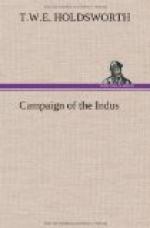half-past eight o’clock, when Wilmer, being rather
wrong in his stomach, got off his horse for a short
time, and Inverarity said he would walk to the top
of the hill to look at the view by moonlight; Wilmer
followed in a few minutes on foot, his ghorewalla
following with his horse. On coming near the top
of the hill before mentioned, he was somewhat astonished
at a large stone whizzing by his head, and immediately
afterwards about six or seven men jumped on him out
of the rocks. He had time to draw back, and received
two different cuts on his walking stick, which cut
it through, and slightly wounded him on the forehead.
He managed to draw back from another, which was made
at him with such strength that the fellow fell with
the force of his own blow. Wilmer then thought
it as time to cut and run, and bolted as fast as he
could with these chaps after him. They luckily,
however, stopped to rob his and Inverarity’s
bangies, containing their kit, which they met his
servant carrying, &c. Wilmer did not stop till
he reached a detachment of the Shah’s force
which is stationed there, he returned with a party
from them, and on reaching the other side of the hill
found poor Inverarity lying on the ground dreadfully
mutilated; he was not quite dead when they came up,
and Wilmer says he can never forget the convulsive
shudder he gave on their arrival, taking them for the
murderers returning to finish him. He died, however,
almost immediately, merely saying, “For God’s
sake, look at my hands! I am afraid I am very
badly wounded.” Thus fell another victim,
as we all feel, to the conciliation principle!
Neither Inverarity’s horse nor anything of then
kit has been since seen, though Wilmer has recovered
his horse. This will give you a pretty idea of
the country we are living in. The next day there
was an order out from Sir J. Keane, in which, after
giving an account of the murder, he begged all officers
never to go out into the country on sporting expeditions
unless in large parties and well armed. The Shah
and Sir John were also on the point of burning down
the village near which the murder occurred, but the
political department would not allow it. Seven
or eight men were, however, taken up, though nothing
certain has been proved. They are still in chains
in the town; what will be done with them I don’t
know. I always have my holster pipes, and pistols
loaded, whenever I ride out, as there is nothing like
being prepared.
I have little to say of Candahar, which appears to
me to be just the same as every other town I have
seen in the East, very dirty, &c. It stands in
a tolerably fertile plain, with hills scattered all
round it. It is a perfect square, each side of
which is nearly a mile in length; two streets, one
from north to south, the other from east to west, run
through it, and bisect each other in the centre:
in these are the different bazaars. The rest
of the town, as it appeared to me as I rode round
the walls the other day, is perfectly deserted.
There are double walls to the town, entire all the
way round, but I should think it could be easily taken.
A great number of the inhabitants have left it on
account of the dearness of provisions, occasioned by
the hungry mouths of so large a force as ours, and
also because, on his first arrival, the Shah wished
to play some of his old arbitrary acts over again.




